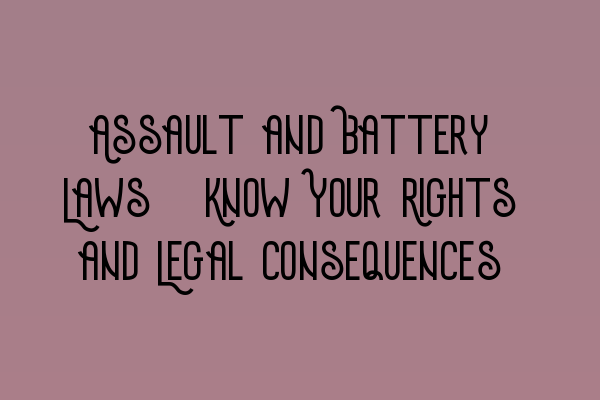Assault and Battery Laws: Know Your Rights and Legal Consequences
Assault and battery, though often used interchangeably, are two distinct criminal offenses in the United Kingdom. Understanding the difference between the two is crucial for both defendants and victims involved in such cases. In this article, we will explore the intricacies of assault and battery laws, the legal rights of individuals involved, and the potential consequences of violating these laws.
What is Assault?
Assault refers to the intentional act of causing someone to fear that they will suffer physical harm. It is important to note that physical contact is not necessary for an assault to occur. Mere words or gestures, if they create a reasonable apprehension of violence, can constitute assault.
There are various types of assault recognized under UK law, including common assault, assault occasioning actual bodily harm (ABH), and grievous bodily harm (GBH). The severity of the offense and subsequent legal consequences depend on the harm caused and the intent of the person committing the assault.
What is Battery?
Battery, on the other hand, involves the intentional and unlawful application of force on another person. Unlike assault, battery requires physical contact. Although assault and battery are often charged together, it is possible to be charged with battery alone.
Similar to assault, battery offenses can range from common battery to more severe instances resulting in actual bodily harm or grievous bodily harm. The extent of the injury and the intent of the offender play a significant role in determining the legal repercussions.
Legal Consequences of Assault and Battery
The legal consequences of assault and battery vary depending on the severity of the offense. In less serious cases, individuals may face fines and community service. However, in cases involving ABH or GBH, the punishment can be significantly more severe, including imprisonment.
If you or someone you know has been accused of assault or battery, it is crucial to seek legal representation to ensure your rights are protected. A skilled solicitor can evaluate the details of your case and provide expert advice and defense strategies tailored to your specific situation.
Know Your Rights
Understanding your legal rights is essential when involved in assault and battery cases. These rights include:
1. The right to be informed of the charges brought against you.
2. The right to remain silent and not incriminate yourself.
3. The right to legal representation throughout the legal process.
4. The right to a fair trial.
Knowing and asserting your rights can significantly impact the outcome of your case. It is crucial to work with a solicitor who specializes in criminal law to ensure your rights are protected and your defense is robust.
Conclusion
Assault and battery are serious offenses under UK law, and understanding the distinction between the two is crucial. Both defendants and victims need to know their rights and the potential legal consequences involved. By seeking professional legal assistance, individuals can navigate the complex criminal justice system and increase their chances of achieving a favorable outcome.
